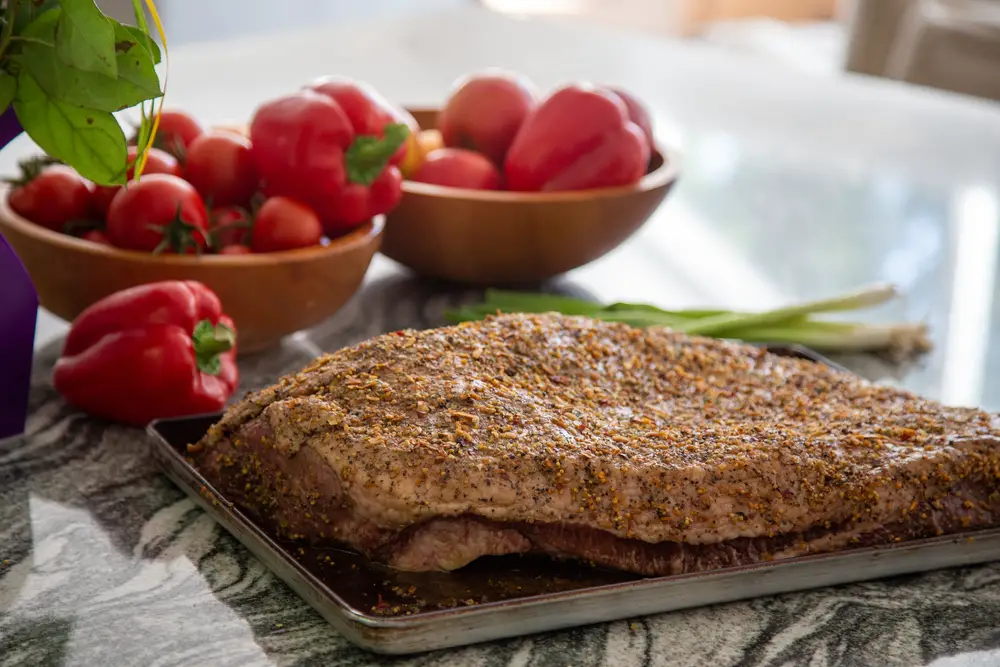
For all of history, the battle has raged on between dry rub and marinade. While this battle may continue to rage on, we have the answer to the age-old question to settle the debate, which is better for smoking, dry rub, or marinade.
A dry rub is not better than a marinade for smoking meat; it is entirely different. Both will add flavors to the outside of your cut of meat.
However, a dry rub will give you a drier finish that will result in that highly sought-after crispy bark if cooked properly. A marinade leaves a moist layer of flavor best suited for a hot grill for that perfect caramelization.
Note: most links in this article are Amazon.com Affiliate links, see Affiliate Disclosure, thank you.
What is the Difference Between Dry Rub and Marinade?
Dry rubs can be combinations of popular seasoning, like pepper, garlic, salt, and smoked paprika. When you coat the outside of your meat with these spices, it will have an almost dry surface.
If you place your meat in a preheated smoker, your meat will form a crust comprising of spices, meat, and proteins. This yummy crust is often referred to as bark.
You want to avoid leaving a dry rub on your meat too long unless you wish to use it as a dry brine. The salt in the rub will slowly pull moisture out of your meat, dry it out.
However, if you vacuum seal your seasoned meat and place it in the fridge overnight, it will perform a process called osmosis. First, the moisture will flow out of the meat, then the process will reverse, and the flavored liquid will re-enter the meat.
If you wish to get that crispy crust of bark, you will need to rinse or wipe the meat, let it dry, and then add a light coat of dry rub before cooking.
Marinades typically have acid, like apple cider vinegar or lemon juice, and a combination of spices. Adding time to the mix allows the acid to infuse the flavors on the surface of the meat.
The idea that marinades tenderize the meat is almost always incorrect. This softening process is known as denaturation, and it occurs when the molecular conformation of protein content is disrupted.
It’s not that the ingredients in marinades don’t have the ability to denature meat. It’s that they don’t penetrate far enough to have an effect on anything other than the surface of your food.
If the acids cannot reach into the meat, denaturation simply cannot take place. On some occasions, as marinades contain lots of quite harsh, acidic ingredients, they can even toughen up the surface of your meat.
The actual flavors of dry rub don’t do a great job of penetrating the meat either, and just like a marinade, only flavor the surface. That is of course, except for the salt content.
Other popular rub and marinade ingredients such as ginger, rosemary, and onions are far too large on a molecular level to penetrate deeper into your food, but being made up of only two ions, salt moseys right on in.
How long do you leave dry rub on a steak?
It would be best if you put a dry rub on a steak 30 minutes before grilling or smoking. In a pinch, 15 minutes will still get great results and might yield a moister steak. If you plan on leaving a dry rub on your steak for more than an hour before cooking, you should vacuum seal or wrap it tightly so your steak can complete a dry brine process overnight in your fridge.
If you’re expecting dinner guests, and you’re in a bit of a time-sensitive situation, don’t worry. You don’t need to bathe your steaks in herbs and spices for days on end to get a flavorful result.
If you’re in a bind, simply leave your steaks to rest in their tasty coating for around 15 minutes.
30 minutes will yield more mouth-watering results, so perhaps, before you begin preparing your other foodstuffs, get those steaks coated and leave them to rest as you work on.
Better yet, if you can allocate an hour to dry rub resting, you won’t regret it. The flavors will permeate the surface, and the salt content will seep in and really make the natural flavor of the meat pop.
Remembering to treat your steaks to a dry rub the day before, leaving them to rest overnight, will give you close to optimum results. I highly recommend giving it a try.
So, bottom line, dry rubbing your steaks should be your first port of call; however, as long as you’ve got 15 minutes spare, you can still enjoy a tongue tantalizing cut of meat.
If I don’t have time or the ingredients to put together my own blend for a dry rub, this Pappy's Choice Seasonings - Original is my go-to. Give it a try; you won’t regret it!
How long should dry rub be on a brisket?

A dry rub should be applied to a brisket from 15 minutes up to 60 minutes before starting your smoking process. If you would like to put the rub on the night before, then treat it as a dry brine, wrap it tightly, rest in your fridge for 6 hours or more, then rinse and re-apply a light coat of dry rub before smoking.
Much like steak, I’d allocate at least 15 minutes to the resting period before cooking; however, 1 hour will be enough to let the meat stew in the herbs and spices. While this will not get the spices to penetrate the meat is will result in the best crispy and flavorful bark.
If you are planning on using your dry rub as a dry brine, 6 hours is considered the minimum for peak flavor permeation on the surface of your brisket. Letting your brisket rest overnight is a great way to approach meal preparation, but anything over 24 hours will be overkill.
However, one thing to bear in mind is that the longer you leave a dry rub on your brisket, the more moisture the rub will absorb, rendering it quite mushy. It will seem like more of a paste than a dry rub.
If you plan on leaving the dry rub on to cook, it’s best to either hold off on dry rub application until a couple of hours beforehand or wash off the current coat and apply a fresh one before you smoke, sear or broil it.
If you’re unsure how to make your own dry rubs, I can’t speak highly enough of this Traeger Grills SPC169 Beef Rub with Molasses and Chili Pepper. It’s bursting with flavor and has very satisfying yet subtle kick to it.
Can you leave dry rub on steak overnight?
Leaving dry on your steak overnight is one of the best ways to ensure maximum flavor transfer. If there is any salt in your dry rub, you should wrap your steak tight or, better yet, vacuum seal it and place it in the fridge.
Not only do the larger molecule ingredients have more of a chance to really paint the steak surface, the salt has more time to work its way into the core of the meat.
You may be thinking that you don’t want your meat to be too salty, but you shouldn’t worry about that. Nowhere near enough salt will be able to penetrate the meat deep enough to shrivel your tongue when you eat it.
Besides, salt does more than give the meat a, well...salty flavor. Salt actually helps your steak retain moisture, and the more moisture the steak retains, the juicer it’s going to be when you finally bite into it.
I’m well aware that there are certain people out there who only enjoy steak when it’s burnt to a crisp and dry as bone, but for the most part, people crave succulence when they dig into a fillet or sirloin.
Allowing your steak to rest in dry rub overnight is 100% the best way to achieve this delectable result.

